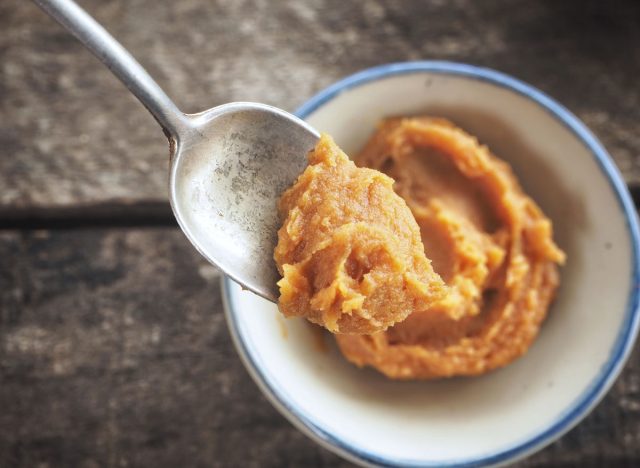7 Fermented Foods Scientifically Linked to Better Health

Fermented foods are having a moment in the spotlight, and rightfully so. Between claims of these foods being linked to better gut health, mental health, and a slew of other aspects of our overall health, it is no wonder why people are happy to pile sauerkraut on their sandwiches or add kefir to their morning smoothies.
Fermented foods undergo a process where added bacteria or yeast break down natural sugars. Once the food or drink is fermented, we are left with a probiotic-containing product that may benefit our health in a variety of ways. Most recently, a study conducted at Stanford School of Medicine showed that eating a diet rich in fermented foods for just 10 days resulted in a more diverse gut microbiome, meaning that the gut has a better balance of “healthy bacteria.” Because of this, the same people experienced an improved immune response. Other data shows that fermented foods may offer anti-inflammatory benefits, blood pressure-lowering effects, and more.
If you are wondering which fermented foods should have a spot in your diet if want to reap the benefits that these functional foods can provide, here are seven fermented foods scientifically linked to better health. Read on, and for more, don’t miss 5 Best Morning Drinking Habits To Support Gut Health.
Yogurt

Yogurt is made by combining dairy milk with live and active cultures, resulting in the creamy food that we love to enjoy with a sprinkle of granola or fresh berries. Yes, many yogurt options have live bacteria, but dairy yogurt is also a source of important bone health-supporting nutrients, including calcium and magnesium. In fact, greater yogurt consumption is associated with increased bone mineral density and physical function in older adults.
Certain probiotic strains found in yogurt enhance intestinal health and overall anti-inflammatory and immune responses. And some data shows that consuming some of these probiotics may be linked to reduced gas among people with IBS.
Kefir

Kefir is a fermented dairy beverage that is slightly tart and easy to sip on. Consuming fermented dairy drinks, like kefir, may help reduce inflammatory markers, abdominal pain, and constipation.
One unique feature of kefir is that it is a natural source of vitamin K2, a nutrient that is linked to a reduced risk of fractures.
Finally, kefir consumption has been linked to a reduction in Helicobacter pylori infection. H. pylori is a bacteria that can infect the stomach, and being infected with it is linked to an increased risk of stomach cancer.
Kimchi

Kimchi is a traditional Korean dish that is typically made from salted and fermented vegetables, like cabbage. Data shows that moderate kimchi intake is associated with weight loss among middle-aged and older people of Korean descent. Other data shows that consumption of kimchi is linked to a reduced risk of developing eczema and anticancer potential against pancreatic cancer cells.
Kombucha

Among the trendy drinks out there, kombucha tops many lists. As a fermented tea, this drink contains antioxidants and, as long as it isn’t pasteurized before it is enjoyed, contains live probiotics.
Some evidence suggests that kombucha consumption may help combat inflammation, support the liver detoxification process, and support a healthy and balanced gut microbiota, but more well-conducted human studies are needed.
Miso

Miso is a fermented soybean paste that is a must-have ingredient in our beloved miso soup. It provides a salty umami flavor and gives the gut a boost of live probiotics when consumed.
Evidence shows that people who consume miso soup daily have a lower risk of developing stomach illnesses such as gastritis, gastric, and duodenal ulcers than those who consume it infrequently or never. Miso also has important compounds that support heart health, including plant sterols, linoleic acid, and vitamin E, and consuming it may help people have a healthy heart.
Sauerkraut

As a popular topping for hot dogs and a must for a classic Ruben sandwich, sauerkraut is a fermented condiment made of fermented cabbage. Regular sauerkraut consumption can contribute to healthy digestive flora. So, feel free to add an extra serving to your sandwich or enjoy some on top of your eggs, knowing that you are giving your gut a dose of healthy bacteria.
Tempeh

Tempeh is enjoyed as a plant-based protein source and it is made from cooked fermented soybeans. Along with the gut health-promoting benefits that fermented foods offers, tempeh consumption may be linked to a reduced risk of type 2 diabetes. Tempeh can be used in stir-fries, sandwiches, and salads.
- Source: https://www.cell.com/cell/fulltext/S0092-8674(21)00754-6
- Source: https://pubmed.ncbi.nlm.nih.gov/28945458/
- Source: https://pubmed.ncbi.nlm.nih.gov/28945458/
- Source: https://pubmed.ncbi.nlm.nih.gov/28462469/
- Source: https://www.ncbi.nlm.nih.gov/pmc/articles/PMC9116469/
- Source: https://www.ncbi.nlm.nih.gov/pmc/articles/PMC9116469/
- Source: https://pubmed.ncbi.nlm.nih.gov/36710113/
- Source: https://pubmed.ncbi.nlm.nih.gov/36360671/
- Source: https://www.ars.usda.gov/research/publications/publication/?seqNo115=338581
- Source: https://pubmed.ncbi.nlm.nih.gov/16801507/
- Source: https://www.ncbi.nlm.nih.gov/pmc/articles/PMC4958626/
- Source: https://pubmed.ncbi.nlm.nih.gov/34053633/
- Source: https://pubmed.ncbi.nlm.nih.gov/36752575/
- Source: https://pubmed.ncbi.nlm.nih.gov/28802302/
- Source: https://pubmed.ncbi.nlm.nih.gov/30055550/
- Source: https://pubmed.ncbi.nlm.nih.gov/34698580/
- Source: https://onlinelibrary.wiley.com/doi/10.1002/fsn3.3029
- Source: https://onlinelibrary.wiley.com/doi/10.1002/fsn3.3029
- Source: https://www.ncbi.nlm.nih.gov/pmc/articles/PMC4268643/
- Source: https://pubmed.ncbi.nlm.nih.gov/36986086/









